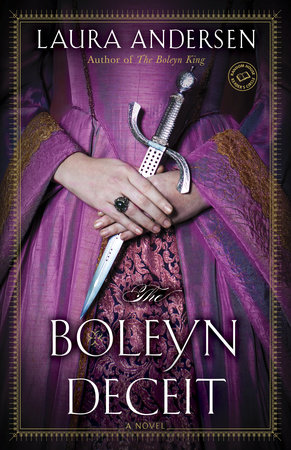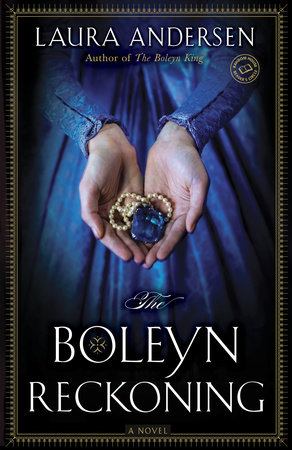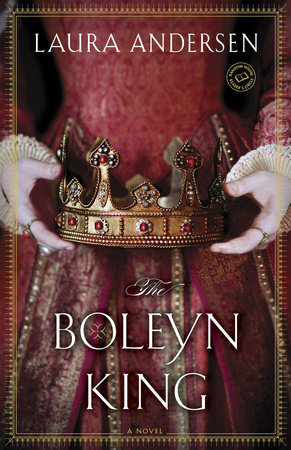Excerpt
The Boleyn Deceit
CHAPTER ONE
Greenwich Palace
21 December 1554
I have but a few minutes before Carrie must dress me for tonight’s festivities. Christmas is nearly here, but tonight’s celebration is rather more pagan. There is to be an eclipse of the moon, and coming as it does on the winter solstice when darkness claims its longest reign, even the most devout are unsettled.
So why not dance and drink and throw our merriment into the dark as a challenge?
Also, there is a visitor at court. His name is John Dee and he is reputed one of the finest minds of the age. He has come to court in the Duke of Northumberland’s company, and William has commanded him to give a private reading of our stars. Only the four of us—for it would not do to let our secrets, past or future, slip into wider circulation.
Despite the cold, every courtyard at Greenwich was filled and more. No one wanted to miss the rare and possibly apocalyptic sight of the moon vanishing into blackness before their eyes. Minuette had barely room to shiver beneath her fur-lined cloak, so closely were people packed on this terrace overlooking the Thames.
She had managed to keep away from the royal party; below her she saw moonlight glinting off Elizabeth’s red-gold hair. William stood near his sister, surrounded as always by men and women. While everyone else’s eyes turned to the heavens, Minuette’s sought a familiar figure in the flickering torchlight. She rather hoped she did not find Dominic standing near William.
A whisper ran collectively through the crowd, transmitting itself more to Minuette’s body than her ear. She looked up: overhead, the edge of the moon’s circle was eaten away. Despite herself, she felt her pulse quicken and wondered what terrible things this might portend.
More terrible than a star’s violent fall? The voice in her head was Dominic’s, an echo of his impatient skepticism.
Minuette fingered the pendant encircling her neck, tracing the shape of the filigreed star, and smiled. This eclipse is no portent of doom, she assured herself, but a sign of great wonder. And that I can believe.
She watched the blackness bite away at the moon until it was half covered and still moving relentlessly onward. There were murmurs around her, some nervous laughter.
A hand came from behind, anchoring her waist with a solidness she could feel even through the layers of fur and velvet and linen. And then, after much too long, a second hand followed until she was encircled. Minuette made herself keep her eyes open, made herself stand straight and not lean back into the comforting weight behind her. Or perhaps comforting was not the right word—for her heart quickened and her breath skipped.
Although she could count on two hands the times Dominic had touched her since the night of her betrothal, her body knew him instantly, as though it had been waiting for this part of her all her life.
Only in the dark did he dare to touch her, for only in the dark could they remain unseen. No one must know, not yet. Not a single whisper must cross the court while William (openly betrothed to the French king’s daughter) threw himself in secret at Minuette’s feet, offering his hand, his throne, and his country to her. It would take time for the king’s infatuation to die. And, until it did, no one must suspect either William’s passion or Dominic’s love.
So Minuette laughed and played and worked and flirted as though everything were normal—as though William had not lost his mind and thought himself in love with her—as though her own heart was not fluttering madly inside a cage, wanting only to wing itself to Dominic—as though she had no secrets and everything was as it had been before. She saw Dominic every day and behaved toward him the same as always: playful and young and oh-so-slightly resentful of his lectures.
And then, like tonight, he would touch her, and she thought she might weep with wanting to turn into him and cling.
Instead, she kept her eyes open and directed at the sky as the moon’s last sliver gave up its fight and slid into nothing.
Gasps went up from the crowd, and in that covering moment, Minuette felt Dominic’s mouth alight softly just below her left ear and linger. She did close her eyes then, and swayed back slightly as his arms tightened around her waist and they both forgot where they were and who, and in a moment she would turn and their lips would meet and she might die if she waited any longer—
A great cheer exploded around and below them, and Minuette’s eyes flew open to see the moon pulling itself away from the darkness. By the tightness of Dominic’s grip on her waist, she knew his frustration. But he was—always had been—the disciplined one.
Within seconds she was standing alone once more, only warm cheeks and quick breathing to betray what no one had seen.
What no one must ever see.
Greenwich Palace had always been a dwelling of pleasure and luxury, of laughter and flirtation, of light and merriment. It was situated on the Thames five miles east of London, close enough to the city for easy access yet far enough to be well out of the crowds and squalor and pestilence. The last two King Henrys had expanded the complex, Elizabeth’s grandfather facing it in red brick and her father adding a banqueting hall and enormous tiltyard. Her father had been born here, as had Elizabeth herself. A beautiful palace for a beautiful court.
On this longest night of the year, the palace blazed with candlelight and what heat the fires and braziers failed to provide was made up for by the great press of bodies. Men and women dressed in their finest, drinking and dancing and circling around their king as though he were the center of their world.
But what happens to that world, Elizabeth wondered, when the center fails to hold?
Ignoring the chatter of voices directed at her, she watched her younger brother, worried and angry with herself for worrying. When William had returned from France last month with a treaty and a betrothal, he’d poured out to his sister his ardent love for Minuette along with his plans to wed her, and ever since Elizabeth had carried a thorn of anxiety that made itself felt at the most inconvenient times. It’s not as though he’s being indiscreet, she told herself firmly. He’s behaving precisely as a young king of eighteen should behave. Dressed in crimson and gold, William flirted with every female in sight (and even a man or two), he drank (but not so heavily as to lose control of his tongue), and he carried on several layers of conversation with the French ambassador at once.
And he had not been nearer to Minuette than ten feet all evening.
Elizabeth, being determinedly talked at by a persistent young cleric, swung her gaze to where her chief lady-in-waiting held court of her own, surrounded by a gaggle of men, young and old, all clearly besotted by Minuette’s honey-light hair and her graceful height and the appealing knowledge that she was an orphan in the care and keeping of the royal court. With the influence she held in her relationships to Elizabeth and William, Minuette would have drawn an equal crowd even if she had been pockmarked and fat. But the men would not then have been eyeing her with quite the same expression.
A voice, very near and very familiar, broke her distraction. “How long,” Robert Dudley said conversationally as he neatly cut out the disappointed and ignored cleric, “is your brother going to continue baiting the French ambassador? William has the treaty he wanted—why make the poor man suffer?”
“Because he can,” Elizabeth replied tartly. “And you do the same—only with less care. Everyone knows your father continues to grumble about peace with France. How hard it is for him to swallow, a pact with the devil Catholics.”
“My father has moved on to other concerns. He’s not one to fight a losing battle.”
“As fine a commentary on the Dudleys as I’ve ever heard.”
Robert raised his eyebrows and lowered his voice that half step that made Elizabeth’s blood warm. “We choose our battles with care—political, religious . . . personal.”
His voice returned to its normal tones and he changed the subject deftly. “Are you looking forward to tonight’s audience? I imagine Dr. Dee has found it difficult to read your stars, complex as you are.”
She gave him a withering look. “I am exceedingly skeptical, seeing as this Dr. Dee comes from your father’s household. No doubt you have whispered to him all the things you most want him to say of me.”
“You wound my integrity,” Robert said, hand on heart. But his voice was serious when he went on. “John Dee is not the sort of man to be persuaded by anything but his own intellect and the truth of what he sees in the heavens. I promise you, Elizabeth, whatever he tells you tonight will be as near as you will get to hearing God’s own words. I only wish I could be there with you.”
An hour later, as Elizabeth and Minuette slipped away from the festivities, she wished Robert were with her as well. She understood the need for privacy—anything that approached foretelling a royal’s future was dangerous, and though William had commanded the audience, that didn’t mean he wanted everyone at court to hear about it—but it was beginning to wear on her being just the four of them all the time. The “Holy Quartet” Robert called them, and not entirely in jest. And now that William took every opportunity of quartet-privacy to fawn over Minuette, Elizabeth’s patience grew thinner with each day.
The two young women wound through increasingly depopulated corridors until they came to one only dimly lit by two smoking torches, its brick walls chilly and bare. There was a single guard wearing the royal badge at a discreet distance from the closed door behind which waited their guest, not near enough to overhear but only to keep the curious away.
Elizabeth opened the door to the east-facing room herself, breath quickening with the rare feeling of anticipation. She was not at all certain what was going to happen in the next hour, and she found the sensation unexpectedly delightful.
The room showed signs of a hasty attempt at comfort, from the deep fireplace blazing with light and warmth to the four cushioned chairs ranged along one side of a waxed wood table. Across the table was a single high-backed wooden chair; the man in it rose to his feet and bowed deeply. “Dr. Dee,” Elizabeth said. “Welcome to court.”
“Thank you, Your Highness.” John Dee straightened and Elizabeth took him in. Although she’d known he was only a few years older than she, not even thirty yet, in person she was struck by his youth. Considering all Robert had said and all she had read from correspondents in England and abroad, it was something of a surprise that this young man had achieved such scientific and intellectual stature; then again, Dee had been a fellow at her father’s Trinity College at the age of nineteen. More recently the King of France had tried to retain him for his court, but John Dee had declined and returned to England after several years on the Continent, lecturing on Euclid and studying with men like Mercator. He had come to the Northumberland household in the service of Robert’s father, and all the court was anxious to meet this man who made things fly and read the stars and charted the heavens with surety.
Elizabeth sat and waved Dr. Dee back to his chair. Minuette sat next to her, uncharacteristically silent. She had been less than enthusiastic about this idea, which surprised Elizabeth. Usually Minuette was the first to embrace the new and entertaining.
Upon examination, John Dee looked like many a scholar or clerk, with his neatly pointed beard and unostentatious clothing. His eyes were deep and thoughtful and steady and he met her gaze without flinching. She liked those who were not cringingly cowed by her—but best not let him take too many liberties.
“Dr. Dee,” she said, looking significantly at the leather portfolio that lay between them on the table, “you are aware that it is treason to tell a king’s future.”
An irrelevant point. It was William who had commanded this private audience, William who had run with the idea of seeing what lay in his stars. Her brother was afraid of nothing, certainly not his future. But casting charts was legally forbidden for royalty, as it might be used as a pretext for rebellion.
Dr. Dee was no fool to fall into such an easy trap. “I do not foretell the future, Your Highness. I interpret the heavens, which is to say, I translate a very little of what God himself has laid in store. And what could God have in store for our good king but glory?”
Would he lie? Elizabeth wondered. She didn’t think he was an open fraud—even if Northumberland would fall for that, Robert Dudley certainly wouldn’t. But it took subtlety to tell a king what he did not wish to hear without making him angry. How much would Dee avoid saying? Or was William truly charmed, with a lifetime of good fortune inscribed indelibly in the heavens?
The door was shoved wide and William strode in, a little the better for good cheer, followed by Dominic dressed in all black and looking more than ever like a shadow ready to wrest the monarch from danger at any moment.
William went straight to Minuette. Bending low over her chair, he kissed her hand in a lingering and proprietary fashion. Just before it would become uncomfortable for the rest of them, he released her and turned to the visitor.
“Dee!” he said. “Welcome to court. We are always glad to reward those who are useful to us.”
No one could have missed the subtext, thought Elizabeth. Tell me what I want to hear, and you’ll be rewarded.
Minuette had brightened with the men’s entrance. “Isn’t this thrilling, to discover what our futures hold in store?” She smiled at William (who laughed), then at Dominic (who did not). “Who is to be first?” she asked.
William dropped into the chair next to hers. “You, sweetling, if you wish. What better way to begin, then, with the stars of the brightest woman at court?”
Elizabeth caught the look that John Dee shot at William before dropping his eyes discreetly. Damn, she thought. He may be young, but he is no fool. And that’s all we need—someone leaking word of how Will behaves with Minuette in private.






